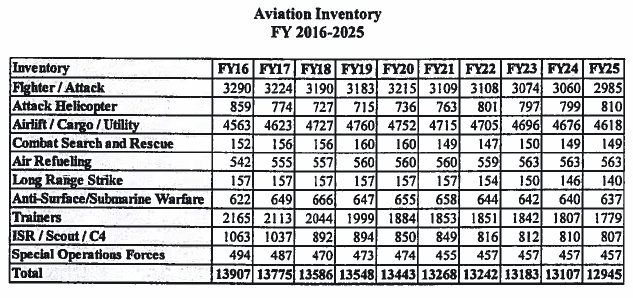You Might Have Missed: Drone Strikes, Nation-building, and the U.S. Aviation Inventory
More on:
Elisabeth Bumiller, “Soldier, Thinker, Hunter, Spy: Drawing a Bead on Al Qaeda,” New York Times, September 3, 2011.
In Mr. [Michael] Vickers’s [top adviser to then-secretary of defense Leon E. Panetta] assessment, there are perhaps four important Qaeda leaders left in Pakistan, and 10 to 20 leaders over all in Pakistan, Yemen and Somalia. Even if the United States kills them all in drone strikes, Mr. Vickers said, “You still have Al Qaeda, the idea.”
(3PA: Since Vickers’ estimate that there were two dozen al-Qaeda leaders left in 2011, more than two-hundred U.S. drone strikes have killed upwards of 1,200 people—apparently non-al-Qaeda leaders. Vickers announced this week that he is stepping down as undersecretary of defense for intelligence after serving in the Department of Defense since 2007.)
Seth G. Jones, “Historical Lessons for the Wars in Iraq and Syria,” Testimony presented before the House Foreign Affairs Committee, Subcommittee on the Middle East and North Africa, RAND Corporation, April 30, 2015, p. 4.
Of those [141] insurgencies that have ended since World War II, nearly three quarters terminated because of a military victory by one side or the other—with [50 insurgencies] 35 percent ending in a victory by insurgents and [52 insurgencies] 37 percent in a government victory. By comparison, only [39 insurgencies] 27 percent ended in a draw, which included such outcomes as a negotiated settlement. But draws have become more common in recent years.
Nicholas Sambanis, Stergio Skaperdas, and William Wohlforth, “Nation-Building through War,” American Political Science Review, 109(2), May 2015, pp. 279-296.
France and Prussia were bargaining in the shadow of shifting power under anarchy, a setting extant theories predict would raise the specter of war. But the standard theoretical toolkit misses critical determinants of actors’ expectations of future power shifts and thus cannot explain their strategic choices. By reintegrating the insights of the real Realpolitik —the classical theory of statecraft—our theory fills major gaps in rationalist theories of interstatewar in a way that resonates powerfully with historical evidence. Expectations about what would influence the social identification of southern Germans explain why an arcane monarchical succession problem was deliberately framed as a zero-sum status contest between two great powers who preferred to fight a war rather than lose prestige. Key elements of this case are missed by the most closely related existing approaches.
First, modern realist theory misses the intimate connection between the politics of social identity and nationalism, on the one hand, and the power politics of security and balancing, on the other hand….
Second, the diversionary war hypothesis is too narrowly focused on the domestic level and misses the Realpolitik pursuit of power in a competitive interstate environment. In most renderings (see, e.g., Snyder 1991; Snyder and Mansfield 2005) foreign belligerence is a suboptimal response to a domestic crisis…
Third, leaders’ concern for status or prestige was not a reflection of their own psychological needs (cf. Lebow 2008), a consequence of “irrationality” or a “myth” covering for other domestic pathologies (e.g., Snyder 1991), or a stand-in for reputation (Dafoe, Huth, and Renshon, 2014). To an important degree, the focus on relative status reflected an assessment of its implication for domestic social identity and subsequent state power.
Fourth, the social identity shift produced by war might not have been long-lived had it not been for the underlying cultural bonds tying Germans together, which in turn explained their investments in state capacity in the aftermath of victory.
U.S. Department of Defense, Annual Aviation Inventory and Funding Plan: Fiscal Years (FY) 2016-2045, April 2015, p. 8.

National Security Archive, “Lyndon Johnson and the Dominican Intervention of 1965,” Electronic Briefing Book No. 513, May 23, 1965, p. 4.
Lyndon B. Johnson: We’re going to have to live with [the Castro Regime] a long time, and I’m prepared to do it. I have nothing in the world I want except to do what I believe to be right. Now, I don’t always know what’s right. Sometimes I take other people’s judgments, and I get misled. Like sending troops in there to Santo Domingo. But the man who misled me was Lyndon Johnson, nobody else. I did that. Ican’t blame a damn human, and I don’t want any of them to take credit for it. [Fortas laughs]And I’ll ride it out. I think it’s a … I’d do the same thing right this second if I got a wire fromAmbassador Sanchez, by God.
And I know how it looks. And it looks just the opposite from the way I want [it] to look. I don’t want to be an intervenor. But I think that … I think Mr. [Fidel] Castro done intervened prettygood when he kicked old [Donald] Reid [Cabral] out. And, honestly, of all the people I saw, I thought Reid was the least dictatorial and the mostgenuine and honest of any of that crowd I met.
More on:
 Online Store
Online Store
